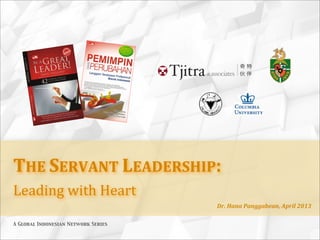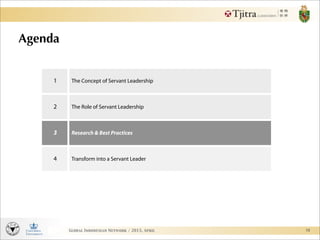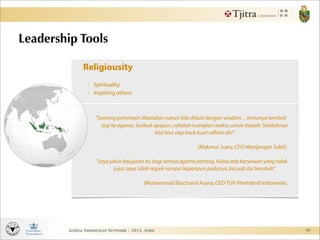GI Net 9 - Servant Leadership Leading With Heart
- 1. THE$SERVANT$LEADERSHIP: Leading(with(Heart( Dr.$Hana$Panggabean,$April$2013 A Global Indonesian Network Series
- 2. Agenda 1 The Concept of Servant Leadership 2 The Role of Servant Leadership 3 Research & Best Practices 4 Transform into a Servant Leader Global Indonesian Network / 2013, April 2
- 3. The Servant Leadership The concept has been existing four decades, yet did not received full attention until almost a decade ago “The servant-leader is servant first… It begins with the natural feeling that one wants to serve, to serve first. Then conscious choice brings one to aspire to lead. “ Robert K. Greenleaf Global Indonesian Network / 2013, April 3
- 4. Are You One? “Do those served grow as persons; do they, while being served, become healthier, wiser, freer, more autonomous (self-reliant), more likely themselves to become servants? And, what is the effect on the least privileged in society; will they benefit, or, at least, will they not be further deprived?” –Robert K. Greenleaf Go to the People Learn from them Live with them Start with what they know Build with what they have. But of the best leaders, When the job is done, When the task is accomplished, The people will all say, “We have done it ourselves.” Lao Tzu, 604 B.C. Global Indonesian Network / 2013, April 4
- 5. Are You One? (ii) “Rather than controlling or wielding power, the servant- leader works to build a solid foundation or shared goals by : “You’ve got to produce more for less, and with greater speed than (1) listening deeply to understand the needs and concerns you’ve ever done before. The only way you can do that in a of others; sustained way is through the empowerment of people. And the (2) working thoughtfully to help build a creative only way you get empowerment is through high-trust cultures consensus; and and through the empowerment philosophy that turns bosses (3) honoring the paradox of polarized parties and working into servants and coaches…” to create ‘third right answers’ that rise above the Stephen Covey compromise of ‘we/they’ negotiations” . Ann McGee-Cooper and Duane Trammell “Servant leadership is ethical, practical, and meaningful. It is ethical because it is about serving people, not using people. It is practical because it is about identifying and meeting the needs of colleagues and customers. It is meaningful because servant- leaders help their colleagues and organizations to grow, enhancing their service to others and contributing to the creation of a more just, caring, prosperous, and sustainable world.” Kent Keith - CEO of the Greenleaf Centre for Servant Leadership (Asia) Global Indonesian Network / 2013, April 5
- 6. Listening • Active Listening Building • Support their decision Empathy Communities • Understand • Build strong community in • Respect his/ her organization • Appreciation Commitment to the Healing Growth of people • Help solve problems & Conflicts Characteristics • Nurture the personal and • Encourage & support growth of employees Stewardship of • Obligation to help and serve Servant Leadership Awareness • Self awareness others • Integrated vies to gain better understanding about values Foresight Persuasion • Identify outcome or Conceptualization consequences of the future • Convince • Think beyond the limits of • Does not take advantage of operating business their powers • Longterm goals • Vision Global Indonesian Network / 2013, April 6
- 7. Agenda 1 The Concept of Servant Leadership 2 The Role of Servant Leadership 3 Research & Best Practices 4 Transform into a Servant Leader Global Indonesian Network / 2013, April 7
- 8. Why Servant Leadership? Leadership$Credibility$Expected People$Focused (Kouzes$&$Posner,$2011) • Ambition • Social Artist • Broad Minded • Spiritual Visionair • Considerate • Cultural Innovator • Competent Servant Leadership • Co-operative • Courageous • Reliable • Agile Suitable for dramatic globalization of economy & technology • Just Global Indonesian Network / 2013, April 8
- 9. ...also for Indonesian context What makes people happy in workplaces? Faktor utama yang membuat responden bahagia di lingkungan kerja, SWA 2012. (n=207) Global Indonesian Network / 2013, April 9
- 10. Agenda 1 The Concept of Servant Leadership 2 The Role of Servant Leadership 3 Research & Best Practices 4 Transform into a Servant Leader Global Indonesian Network / 2013, April 10
- 11. Works on Servant Leadership Increasing: • Organizational citizenship behavior (Ertharts, 2004). • Enhancing self-efficacy (people’s self confidence in their ability to perform a specific tasks well), creating a service climate at work, and establishing a fair workplace Individual$Level (Walumbwa, Hartnell, and Oke, 2010). • Encourage employee creativity (Neubert, Kacmar, Carlson, Chonko, & Roberts, 2008). • Positively related to follower job satisfaction (Mayer, Bardes, & Piccolo,2008). • Provide psychological safety to team members leading to willingness to take risks associated with being creative, willingness to challenge the status quo and are motivated to perform well as a way of reciprocating for fair treatment by the leader (Schaubroeck et. All, 2008). Team$Level • Positively related to team potency (team confidence in its ability to perform well) and subsequent team performance (Hu & Liden, 2011). Higher company performance ( measured by return on assets) Organizational$Level Peterson et. Al. 2012 Global Indonesian Network / 2013, April 11
- 12. Practices: Indonesian Global Leaders “ Chinese all appear quite polite and distant, while Indonesians are more warm and nicer” “Basically, they (Indonesians) seldom become angry even when we confronted with very serious problem)” Chinese Respondents ” (Indonesian boss will tell you where you did not good enough, and provide you chance to correct)” • Humble • Humility • Approachable • Personal caring • Tolerant ”Ya memang budayanya berbeda, jadi kita tidak bisa Indonesian Leaders paksakan” “Jangan sampai menyinggung pihak kiri, jangan sampai menyinggung pihak kanan. Ini kita kecil kok, gitu. Ya kan...” (Don’t offend the party at the left, don’t offend the party at the right. This is small. Right…) “I think normally we don’t raise voice. We don’t screamed. It is hard to accept that, only when extremely extremely extremely angry, you raise your voice.” Global Indonesian Network / 2013, April 12
- 13. Practices: Indonesian Leaders in Change Leadership (Pemimpin & Perubahan, 2012) Authenticity • Dialogue • Being honest • Open mind • Promoting ‘gotong royong’ • No Impression Management! Erwin Tenggono Direktur, Dexa Medica Advisor, PT Anugrah Argon Medica Global Indonesian Network / 2013, April 13
- 14. Practices: Indonesian Leaders in Change Leadership (Pemimpin & Perubahan, 2012) Merakyat • Social investment: creating high trust climate • Make time for people : get to know your people • Humble & engagement • Understand the culture Rudi Pesik CEO DHL Indonesia Kopi Kamu Global Indonesian Network / 2013, April 14
- 15. Practices: Indonesian Leaders in Change Leadership (Pemimpin & Perubahan, 2012) Leadership legacy • Inspiring visions • Leader talents • Learning culture • Innovative systems Suhartono CEO, Federal International Finance Global Indonesian Network / 2013, April 15
- 16. Agenda 1 The Concept of Servant Leadership 2 The Role of Servant Leadership 3 Research & Best Practices 4 Transform into a Servant Leader Global Indonesian Network / 2013, April 16
- 17. Transformation Growing from TRADITIONAL BOSS/ SUBORDINATE to SERVANT-LEADER 1. Views problems as someone else’s fault and 1. Views problems as opportunities to learn responsibility to solve. and add value. Sees how he/she keeps the problem going. Contributes to solutions. 2. Participates in rumors. Often cynical and 2. Respectfully sticks to facts, avoiding rumors. feeling overwhelmed. Chooses to be part of the solution, not part of the problem. 3. Waits to be told what to do or be reminded 3. Self-directed. Takes responsibility for of commitments. Does the least possible. planning and follow-through. Is personally accountable for results. 4. Feels that personal value comes from 4. Feels that personal value comes from individual talents and abilities. mentoring and working collaboratively with others. 5. Controls information to maintain power. 5. Shares big-picture information. 6. Views accountability as assigning blame. 6. Views accountability as creating a safe environment for learning from experience. 7. Highly competitive and independent; seeks 7. Highly collaborative and interdependent; personal credit for achievement. generously gives credit to others. 8. Develops personal power base; uses perks 8. Develops trust across a network of and titles to signal who has power. constituencies; breaks down hierarchies. 9. Eager to speak first; feels his/her ideas are 9. Most likely to listen deeply and respectfully, most important. first; values others’ input (especially those who disagree) and builds strength through differences. 10. Uses personal power and intimidation to 10. Uses personal trust and respect to build leverage what he/she wants. bridges. Does what’s best for the “whole.” 11. Focuses only on fast action. 11. Focuses on gaining understanding, input, and buy-in from all parties; understands that faster is often slower. 12. Uses humor to control others. 12. Uses humor to lift others up and make it Ann McGee - Cooper & Associates, 2003 safe to learn from mistakes. (Gathered from research within the Servant-Leadership Learning Community) Global Indonesian Network / 2013, April 17 Building a Leaderful Culture
- 18. Leadership Tools Panutan • Menjadi panutan/mentor • Developing others • Empowering “ Pemimpin harus bisa menjaga integritasnya sebagai contoh untuk bawahannya. Tanpa integritas, organisasi akan jatuh” (Gregorius Hariyanto, CEO CS Insurance) Grafik fungsi kepemimpinan, SWA 2012 Global Indonesian Network / 2013, April 18
- 19. Leadership Tools Religiousity • Spirituality • Inspiring others “Seorang pemimpin dikatakan sukses bila diikuti dengan wisdom…tentunya kembali lagi ke agama. Sesibuk apapun, cobalah luangkan waktu untuk ibadah. Setidaknya kita bisa step back buat refleksi diri” (Makmur Juary, CFO Menjangan Sakti). “ Saya yakin kejujuran itu bagi semua agama penting. Kalau ada karyawan yang tidak jujur, saya tidak respek sampai kapanpun padanya, kecuali dia berubah” (Muhammad Bascharul Asana, CEO TUV Rheinland Indonesia). Global Indonesian Network / 2013, April 19
- 20. Thank$You Contact us via … Mail to: hana.panggabean@atmajaya.ac.id hanaatmoko@yahoo.com id.linkedin.com/pub/hana-panggabean Global Indonesian Network Follow us at Twitter @Glob_indonesian Visit us at http://globalindonesian.net




















